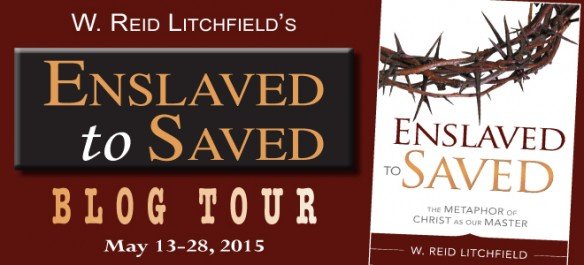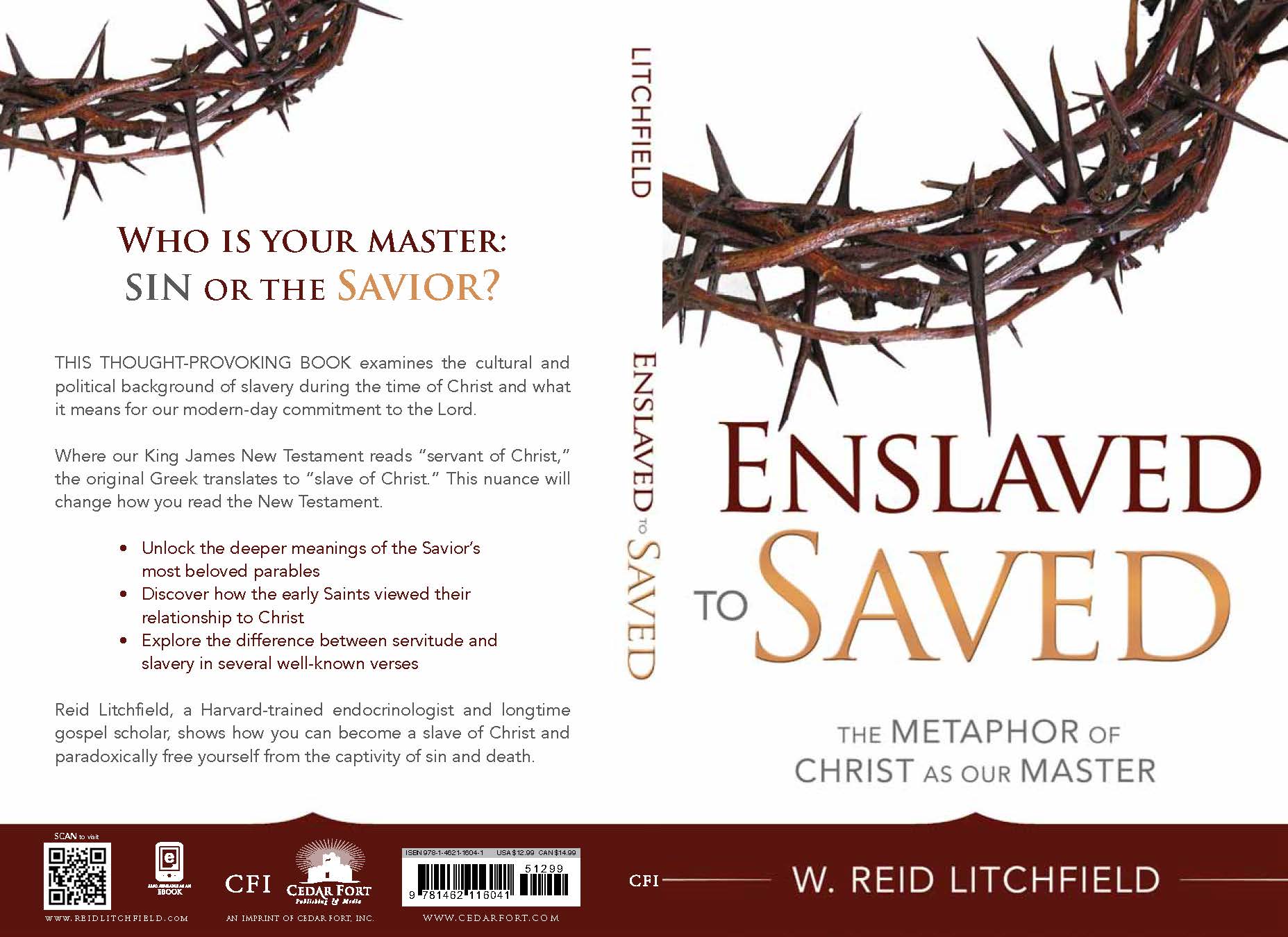I was recently offered the privilege of previewing Reid Litchfield’s new book, Enslaved to Saved, which will be formally published on 12 May.
After scanning the first few pages, I called out to my husband, who studied New Testament Greek at BYU decades ago.
“Bryan,” I said. “What is the Greek word for servant in the New Testament?”
“That would be δοῦλος,” Bryan replied. “d – o – u – l – o – s. Technically, it means slave.”
Huh. That puts a different spin on things!
I haven’t finished the book yet, but so far it has been truly thought-provoking.
Reid said I could give away two copies of the book – either hard copy or eBook format. If you are interested in getting a copy, please make a comment below (include what format you wish). I’ll hold a drawing Monday morning and announce the winners. No need to put personal information in your post, I’ll contact you using the e-mail you type in when making a comment.
Looking forward to hearing from you!




New Post: Book Giveaway: Enslaved to be Saved: I was recently offered the privilege of previewing… http://t.co/yWFi3x2CgQ #LDS #Mormon
Sure, sign me up. Hardbound.
TheMillennialStar: Book Giveaway: Enslaved to be Saved http://t.co/8pa5tYjD8s #lds #mormon
What an interesting concept. I would love to read more. Hardbound.
I have noticed in the King James Bible, the term “yoke” is used in different contexts. Sometimes it seems to refer to the wooden device that spans two draft animals to allow work in tandem. Other times it clearly refers to the iron neck band used to denote bondage and slavery.
I’d love a copy. Either format. Thanks!
I’d love a copy! Hardbound preferred but I’d take either.
Meg, why did you put the “be” in the title?
Ah – that would be because so much of the New Testament imagery deals with becoming a servant of God (slave of God) and how by taking His yoke upon us we are freed from death and sin. But now that you mention it, I clearly was inserting a word that isn’t in the title. So I have updated the Title and text of this post.
Sounds like a good book, I’d be very happy with either format. 🙂
I am always interested in a new book, e-book would be great if it is in kindle format. And I love your polygamy posts. Post more. Thanks.
That sounds very interesting. Ebook would be best, I think.
Diging into the original languages is always an enlightening experiance. Ebook
A contest? Hard-core, please.
I like thinking of New Testament people as real people.
Oops! Hard-cover!
Hardcover. Thanks for the opportunity.
That sounds fantastic. Hard bound. Thank you.
I would love a copy. Sounds fascinating. Hardbound.
I would love a hardback copy. Thank you!
So there are 19 comments and I went to Excel and entered the following formula in three cells:
=Roundup(19*rand(),0)
I knew comments 1 and 3 were retweets, so kept updating until I had no instances of 1 * 3.
The answers came back…
15 (ji on May 9, 2015 at 7:48 pm )
19 (Kristin on May 10, 2015 at 10:53 pm)
and a third number in case one of the first two was me.
Congratulations ji and Kristin!
I’ll contact you via e-mail to get information so the book can be shipped to you.
Wow! I don’t think I ever won a contest before!
I look forward to the book. I much enjoy reading about the New Testament and it’s cultural context and so forth. A book I read recently that I’ll mention here: Gerhard Lohfink’s Jesus of Nazareth: What He Wanted, Who He Was — unlike some Catholic theologians, Father Lohfink is a real believer, and his book helped me understand a little better about how people then and there felt when they heard Jesus teach.
“unlike some Catholic theologians, Father Lohfink is a real believer”
What an unnecessary, uncharitable, and frankly ignorant statement. Many Catholic theologians — and most Catholic clergy, many of whom are also highly regarded and credible theologians — could easily teach all of us Mormons a thing or two about being real believers.
I think that ji understands the difference between “some” and “many”. Hopefully others do to. So where ji’s statement using some really does not paint with a very broad brush at all, the use of “many” truly does. The use of “all” seems to take it even further, turning on the airless with full pressure and a wide nozzle. By definition, ji’s use of “some” indicates that “many” are the opposite.
So I, possibly as “many” others, do not seek to find that ji is taking “many” theologians to task, but rather just some. Which can often be a very small number. However, I suppose that for those that wish to broaden the scope to justify their needs or some desire to be angry about something, they will be able to, odd as that may seem from basic word definitions.
Thank so much Meg (and your excel program)! I have never won anything like this either and to have it be a book I am excited to read is just that much better!